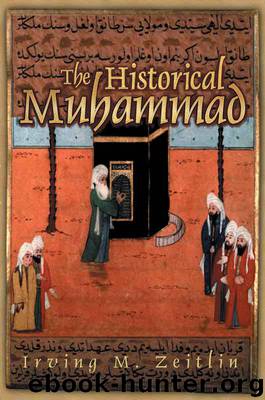The Historical Muhammad by Zeitlin Irving M.;

Author:Zeitlin, Irving M.;
Language: eng
Format: epub
Publisher: Polity Press
7
Richard Bell’s Origin of Islam in its Christian Environment
Bell opens his classic study with the suggestion that the triumph of Islam in the seventh century CE, can best be understood as a victory over what he calls a “degenerate Christianity,” a Christianity plagued by sectarian conflict and the alliance of the Church with the State. This alliance was so tight that the bishops and other high dignitaries of the Church became, in effect, State officials. This was so much the case, that the acceptance of Christianity was regarded as acceptance of subservience to the Roman Empire of the East. This fact has definite significance for Bell, when trying to understand the social conditions of Arabia before and during the time of Muhammad. For it helps to explain the alacrity with which even Christian Arabs accepted an Arabian prophet. The Church–State alliance also played a part in forming Muhammad’s conception of religion. For Christianity appeared to him to be not merely a religion, but a State as well, which might explain why, beginning in the Medinan period, Islam became political in the full sense: the pursuit of power and hegemony became an essential element of the Prophet’s theory and practice.
For Bell, then, the Church–State alliance of the Byzantine empire, which came to be perceived by the people as a highly oppressive, foreign institution, was one important reason for Christianity’s loss of appeal. Another manifestation of Christianity’s “degeneration” at the time was its having been torn by internal strife and schism. It was weak in moral and religious insight when called on to meet the challenge of Islam; dogma took the place of reflection where religious questions were concerned. As the power of the State was available to the worldly, ambitious, prideful prelates, they were only too ready to employ State power against doctrinal opponents. As a consequence of the doctrinal quarrels, the Eastern Church became irreparably divided, and the Christian Empire correspondingly vulnerable to dismemberment by Muhammad’s warriors. The main result of the sectarian, metaphysical exercises was that when Islam arrived in Syria and Egypt fully armed, it found a Church divided by embittered feelings, thus making Christians more eager to defeat Christian “heretics” than to unite against a common foe. Moreover, there was wide and deep discontent among the indigenous peoples who resented the Church–State alliance, which sought to force them into the acceptance of a hated doctrine, and a hated, heavy tax, in addition.
Bell, thus showing how Christianity had become a negative stimulus for the peoples of Syria and Egypt, proceeds to explore positive Christian influences on Islam. “Some things in the Quran and in Islam,” he writes, “which appear especially Jewish, may really have come through nominally Christian channels.” Noteworthy, however, is what Bell has to say in the balance of this passage:
But even with that allowance there is no doubt about the large influence exercised by Judaism. There were Jews in Arabia long before Muhammad’s time. In Medina they were numerous, and the fact that many of
Download
This site does not store any files on its server. We only index and link to content provided by other sites. Please contact the content providers to delete copyright contents if any and email us, we'll remove relevant links or contents immediately.
| Arms Control | Diplomacy |
| Security | Trades & Tariffs |
| Treaties | African |
| Asian | Australian & Oceanian |
| Canadian | Caribbean & Latin American |
| European | Middle Eastern |
| Russian & Former Soviet Union |
The Secret History by Donna Tartt(18157)
The Social Justice Warrior Handbook by Lisa De Pasquale(11951)
Thirteen Reasons Why by Jay Asher(8451)
This Is How You Lose Her by Junot Diaz(6434)
Weapons of Math Destruction by Cathy O'Neil(5829)
Zero to One by Peter Thiel(5488)
Beartown by Fredrik Backman(5350)
The Myth of the Strong Leader by Archie Brown(5237)
The Fire Next Time by James Baldwin(5016)
How Democracies Die by Steven Levitsky & Daniel Ziblatt(4952)
Promise Me, Dad by Joe Biden(4908)
Stone's Rules by Roger Stone(4855)
100 Deadly Skills by Clint Emerson(4688)
A Higher Loyalty: Truth, Lies, and Leadership by James Comey(4550)
Rise and Kill First by Ronen Bergman(4543)
Secrecy World by Jake Bernstein(4388)
The David Icke Guide to the Global Conspiracy (and how to end it) by David Icke(4377)
The Farm by Tom Rob Smith(4322)
The Doomsday Machine by Daniel Ellsberg(4244)
